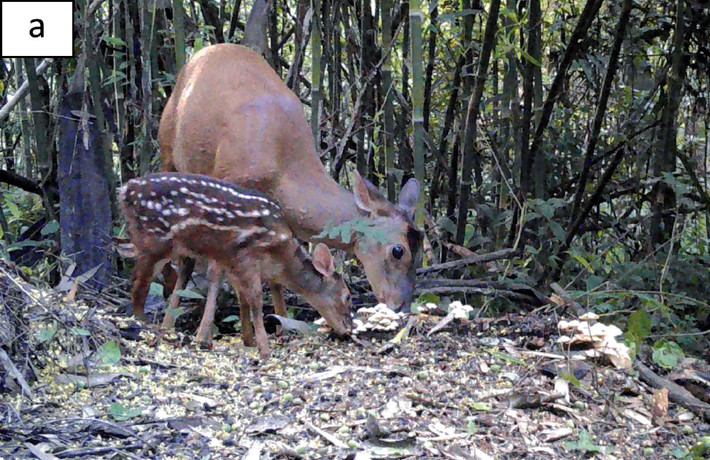Consumption of mushrooms by Mazama rufa (Illiger, 1815) in the subtropical Atlantic Forest
DOI:
https://doi.org/10.31687/SaremNMS24.11.3Keywords:
Artiodactyla, Cervidae, mycophagy, red brocket deer, ungulateAbstract
Mazama rufa (Illiger, 1815) is a recently revalidated species, and several aspects of its ecology remain unknown. Here we aimed to describe the consumption of mushrooms (Basidiomycota) by M. rufa. Our study was carried out in the Iguaçu National Park (Atlantic Forest), where we made two records of fungi consumption by M. rufa using camera traps. The importance of fungi in the diet of M. rufa is unknown, but their consumption can increase the intake of important macronutrients for the survival of organisms. Further investigations may elucidate the importance of mushrooms in the diet of these animals.
References
Alvares, C. A, J. L. Stape, P. C. Sentelhas, J. de M. Gonçalves, & G. Sparovek. 2013. Köppen's climate classification map for Brazil. Meteorologische Zeitschrift 22:711–728. https://doi.org/10.1127/0941-2948/2013/0507.
Bisbal, F. J. 1994. Biología poblacional del venado matacán (Mazama spp.) (Artiodactyla: Cervidae) en Venezuela. Revista de Biología Tropical 42:305–313.
Black-Decima, P., et al. 2019. Tropical ungulates of Argentina. Ecology and Conservation of Tropical Ungulates in Latin America (S. Gallina-Tessaro, ed.). Springer International Publishing, New York.
Branan, W. V., M. C Werkhoven, & R. L. Marchinton. 1985. Food habits of brocket and white-tailed deer in Suriname. The Journal of Wildlife Management 49:972–976. https://doi.org/10.2307/3801381.
Brocardo, C. R., et al. 2019. Mamíferos do Parque Nacional do Iguaçu. Oecologia Australis 23:165–190. https://doi.org/10.4257/oeco.2019.2302.01.
Claridge, A. W., & J. M. Trappe. 2005. Sporocarp mycophagy: nutritional, behavioral, evolutionary, and physiological aspects. The Fungal Community (J. Dighton & J. F. White, eds.). CRC Press, Mycology Series, Boca Raton.
Elliott, T., C. Truong, S. Jackson, C. Zúñiga, J. Trappe, & K. Vernes. 2022. Mammalian mycophagy: a global review of ecosystem interactions between mammals and fungi. Fungal Systematics and Evolution 9:99–159. https://doi.org/10.3114/fuse.2022.09.07.
Elliott, T. F., & K. Vernes. 2021. Camera trap detection of mycophagy among co-occurring vertebrates. Austral Ecology 46:496–500. https://doi.org/10.1111/aec.12988.
Emmons, L. H., & F. Feer. 1997. Neotropical rainforest mammals: a field guide. University of Chicago Press, Chicago.
Falandysz, J. 2008. Selenium in edible mushrooms. Journal of Environmental Science and Health Part C 26:256–299. https://doi.org/10.1080/10590500802350086.
Gayot, M., O. Henry, G. Dubost, & D. Sabatier. 2004. Comparative diet of the two forest cervids of the genus Mazama in French Guiana. Journal of Tropical Ecology 20:31–43. https://doi.org/10.1017/S0266467404006157.
González, S., & J. M. Barbanti Duarte. 2020. Speciation, evolutionary history and conservation trends of Neotropical deer. Mastozoología Neotropical 27:37–47. https://doi.org/10.31687/saremMN_SI.20.27.1.05.
Grotta-Neto, F., A. Vogliotti, M. de Oliveira, F. Passos, & J. Barbanti Duarte. 2024. Brocket deer niche breadth and overlap: spatial similarities limit species coexistence. Journal of Zoology 324: 21–33. https://doi.org/10.1111/jzo.13180.
IBDF & Fundação Brasileira para Conservação da Natureza. 1981. Plano de manejo do Parque Nacional de Iguaçu. Instituto Brasileiro de Desenvolvimento Florestal – IBDF, Brasília.
Launchbaugh, K. L., & P. J. Urness. 1992. Mushroom consumption (mycophagy) by North American cervids. The Great Basin Naturalist 52:321–327.
Mikich, S. B., & S. M. Silva. 2001. Composição florística e fenologia das espécies zoocóricas de remanescentes de Floresta Estacional Semidecidual no centro-oeste do Paraná, Brasil. Acta Botanica Brasilica 15:89–113.
Paglia, A. P., et al. 2012. Lista anotada dos mamíferos do Brasil. 2ª Edição. Occasional Papers in Conservation Biology, Belo Horizonte.
Peres, P. H., et al. 2021. Revalidation of Mazama rufa (Illiger 1815) (Artiodactyla: Cervidae) as a distinct species out of the complex Mazama americana (Erxleben 1777). Frontiers in Genetics 12:742870. https://doi.org/10.3389/fgene.2021.742870.
Prasniewski, V. M., et al. 2022. Brazil's Iguaçu National Park threatened by illegal activities: predicting consequences of proposed downgrading and road construction. Environmental Research Letters 17:024024. https://doi.org/10.1088/1748-9326/ac4e39.
Varela, D. M., R. G. Trovati, K. R. Guzmán, R. V. Rossi, J. M. B. Duarte, & J. Duarte. 2010. Red brocket deer Mazama americana (Erxleben 1777). Neotropical Cervidology (M. B. Duarte & S. González, eds.). Funep/IUCN, Jaboticaba.
Vasco-Palacios, A. M., S. C. Suaza, M. Castanõ-Betancur, & A. E. Franco-Molano. 2008. Conocimiento etnoecólogico de los hongos entre los indígenas Uitoto, Muinane y Andoke de la Amazonía Colombiana. Acta Amazónica 38:17–30.
Wallis, I. R., A. W . Claridge, & J. M. Trappe. 2012. Nitrogen content, amino acid composition and digestibility of fungi from a nutritional perspective in animal mycophagy. Fungal Biology 116:590–602.

Downloads
Published
How to Cite
Issue
Section
License
Copyright (c) 2024 Talita Simionatto, Victor M. Prasniewski, Neucir Szinwelski, Carlos R. Brocardo

This work is licensed under a Creative Commons Attribution-NonCommercial 4.0 International License.

